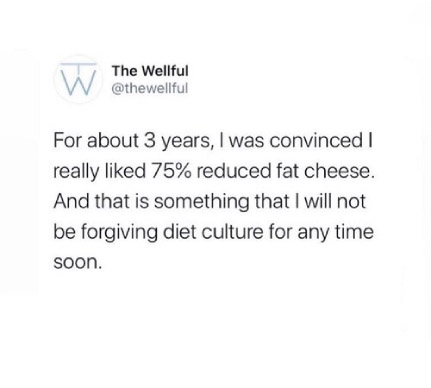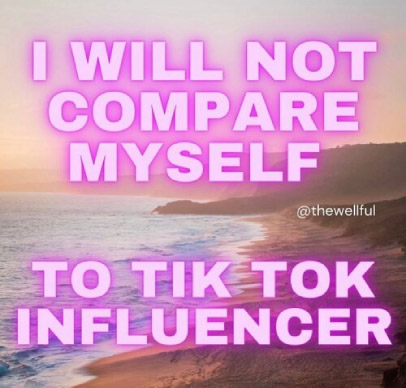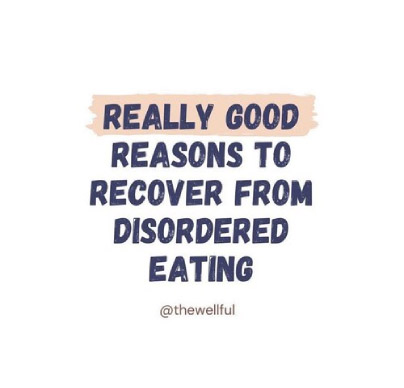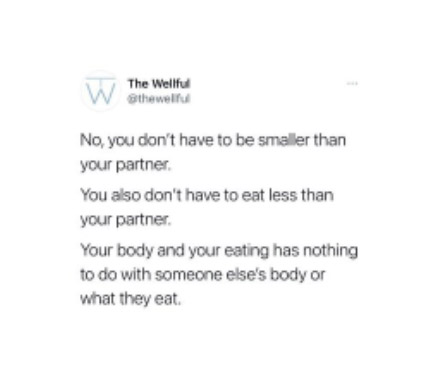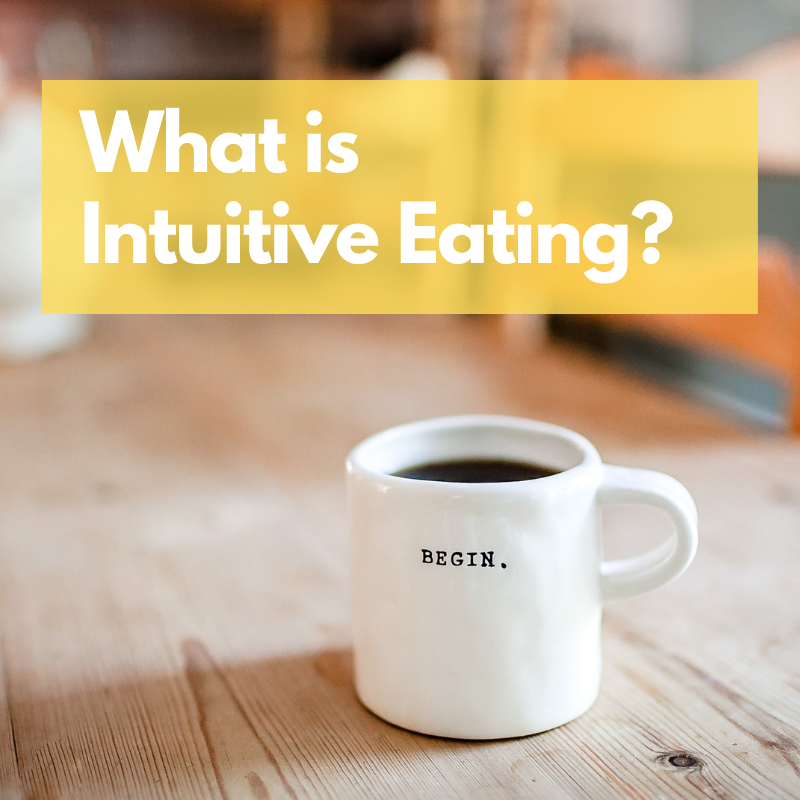
Intuitive Eating might seem like the trendy new fad on the block, but it’s actually been around for a while (and tbh we’re all born intuitive eaters!). Think about a little kid who cries when they’re hungry, runs off to go play when they’re full or disinterested in food, and enjoys things that taste good, without the guilt or shame – that’s intuitively eating. The book “Intuitive Eating: A Revolutionary Program that Works” was written by Registered Dietitians, Evelyn Tribole and Elyse Resch in 1995 and has since continued to gain popularity as our research and understanding of the harms of dieting and diet culture has grown.
What is Intuitive Eating? Who is it for?
Intuitive Eating is a non-diet approach to health. It helps you move away from dieting and feelings of guilt or stress around food, so that you can have a more peaceful and healthy relationship with food and your body. Intuitive Eating focuses on your internal cues based on trust and awareness of what your body needs, like hunger, fullness, satisfaction, food preferences. With dieting, you’re often focusing about external cues (where someone else is making rules for you to follow) like the number of calories in a food, it’s macros, a specific diet plan, or ‘good’ and ‘bad’ foods. Intuitive eating helps you to tune out the noise of those external cues and dieting messages so that you can better understand your internal cues to develop a healthy relationship with food and your body. Think of it like this: intuitive eating gives you the flexibility to listen to your body and give it what it needs vs. letting an arbitrary ‘12pm lunch’ mean you shouldn’t be hungry before noon. Some days you are hungrier than others, some days you’ll want sweets, other days you’ll crave veggies (yes, really) by taking away the ‘shoulds’ you can focus on giving your body what it wants and needs. Intuitive Eating is for everyone – whether you’re always trying a new diet, feeling obsessed around food, stressed out about what you ‘should’ be eating or just want to have a better relationship with food and your body.
*A common question is ‘what about if there are foods I can’t have for medical reason?” In short, of course you wouldn’t eat foods you’re allergic to or otherwise need to avoid, but we can liberalize your diet and relationship with food. Food allergies and intolerances can make food feel very scary and out of your control, by working to reduce that fear – while keeping you safe – a non-diet approach can be very liberating.
How do I start?
The first step is to say ‘no’ to dieting. The holidays are around the corner, but that doesn’t mean you need to jump on the diet (whole 30, keto, intermittent fasting, paleo, sugar-free-desserts-only) bandwagon. We have increasing studies to show us that dieting is harmful and dangerous for your health, and we also know that dieting doesn’t necessarily = healthier food options or habits. Restrictive and cyclic dieting is associated with higher rates of disordered eating and preoccupation with food, lower body satisfaction, and weight gain. By moving away from diets and tuning into your internal cues, intuitive eating is associated with more positive body image, greater body appreciation, and self esteem – and even better cardiometabolic markers like lowered triglycerides and higher HDL (good cholesterol). If you feel like everyone you know is on a diet, fill your social media feed with people who aren’t promoting diets – search for hashtags like #nondiet #intuitiveeating #allfoodsfit.
Ditch the food labels! No food is ‘good,’ ‘bad’ or makes you ‘guilty’. When we label foods this way it influences our perception of the foods and our behaviors around them! When you label a food as ‘bad’ you normally restrict it to only let yourself have it on special occasions. This sets you up for feeling out of control around the food when you do have it and then feeling guilt or shame after. When you ditch the labels and restrictions around foods, you can choose the ones you actually want, when you want them and enjoy them too! When foods become something you can have any day, it establishes the trust in your body that this isn’t the last time you’ll be able to eat that food – so it helps get rid of that ‘last supper’ mentality.
Start practicing Mindful Eating. Mindful Eating is the act of bringing mindfulness – non-judgemental awareness and curiosity – to your eating. Mindful Eating helps you notice your hunger and fullness around the meal, what your food actually tastes like and if you like that food! Try taking 3 deep breaths before your meal, noticing the appearance, taste, smell, texture, even sound of your food and make note of your hunger, fullness and satisfaction before, during and after the meal. [Download The Wellful’s FREE Mindful Eating & Satisfaction Guide]
How long does it take to start intuitively eating?
Everyone’s journey with Intuitive Eating is different – if you’ve been yo-yo dieting or restricting for years, it might take longer to ‘unlearn’ some of what diet culture has taught you. Other parts might ‘click’ or feel easier from the beginning. The main takeaway is that Intuitive Eating is a means to a sustainable and healthful approach to food and health for life – not just a 6-week diet plan – so there will be ebbs and flows along the way that are totally normal. A common misconception is that you can be ‘good’ or ‘bad’ at intuitive eating – not true! Ditching dieting and developing your healthy relationship with food is a process – it’s not linear and there isn’t such a thing as a “perfect intuitive eater.” By saying ‘no’ to the ‘I need to diet through the holidays’ this season, you’re already taking the first step toward Intuitive Eating.
What does a day of ‘normal eating’ look like?
Intuitive Eating is ‘normal eating’ so there isn’t really a typical day! A day of intuitive eating includes eating foods that you like, that nourish you, and eating for both physical hunger and for satisfaction. This is a common question since so many diet and meal plans can lay out exactly what you ‘should’ eat in something like in What I Ate Wednesday posts. Not only can this cause ‘compare-itis’ around what you’re eating compared to someone else, but that also encourages that ‘black and white’ thinking we want to avoid. Instead, I like to explain intuitive eating in an instagram series I started called ‘Why I Ate Wednesdays.’ (#whyiatewednesday) By focusing on the ‘why’ we’re eating instead of the ‘what’ is a helpful way to reframe your thoughts decisions around food. Examples of this might be “I know I feel best when I start my day with a satisfying breakfast including protein”, “I pack a balanced snack so that I’m not overly hungry by the time lunch comes around”, “I really love that dessert and they’re serving my favorite, so I’ll have some today”. It’s bringing together that awareness of what your body needs with foods you like and enjoy, and mostly removing the judgement and fear from food.
Whew! That’s just scratching the surface. Feel like you’re ready to leave dieting behind and find food and body freedom? I’m accepting new clients for virtual nutrition therapy and body image work, sign up for a free discovery call to get started!





